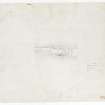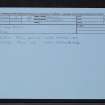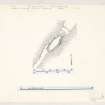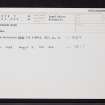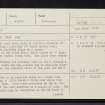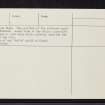Pricing Change
New pricing for orders of material from this site will come into place shortly. Charges for supply of digital images, digitisation on demand, prints and licensing will be altered.
Eilean Righ
Dun (Prehistoric)
Site Name Eilean Righ
Classification Dun (Prehistoric)
Alternative Name(s) Eilean Righ 1
Canmore ID 22857
Site Number NM80SW 5
NGR NM 8041 0220
Datum OSGB36 - NGR
Permalink http://canmore.org.uk/site/22857
- Council Argyll And Bute
- Parish Kilmartin
- Former Region Strathclyde
- Former District Argyll And Bute
- Former County Argyll
NM80SW 5 8041 0220.
(NM 8039 0219) Fort (NR)
OS 6" map, Argyllshire, 2nd ed., (1900)
A small oval fort, with an internal diameter of 68' x 20' within a probably 10' thick double wall, standing on an isolated ridge in a marsh. Parts of the outer face, which stands to 6' high, have fallen to reveal cross-ties. The inner face stands to 2' high. The entrance has probably been on the N through a semi-natural cleft and the gateway may be complete under tumble. There are possible cells at the gate and the S end.
M Campbell and M Sandeman 1964.
Situated on an isolated ridge is a small oval fort measuring c. 31.Om NE-SW x 12.0m over walls from 3.0m to 5.0m wide. Where best preserved on the W, the outer face of the wall survives to a height of 3.0m. The inner face could only be identified on the NE where it stands c. 0.3m high. The position of the entrance could not be ascertained. About 6.0m to the NE is a possible rock-cut ditch c. 4.0m wide which probably supplied the material for the wall.
No trace of any "cells" could be found.
Visited by OS (R D) 24 April 1970.
Field Visit (June 1983)
This dun is situated about 650m NNE of the house at the centre of Eilean Righ on the grassy summit of a ridge which stands 10m above the level of the adjacent ground with steep slopes and rock faces to the NW and SE; (Canpbell and Sandeman 1964), access, however, is relatively easy from NE and SW along the spine of the ridge.
The dun is long and narrow, measuring about 23m by 6.75m at its widest point within a wall founded considerably below the level of the summit, and varying between 3.5m and 2.5m in thickness. Only a few individual inner facing-stones can be identified, but several lengths of the outer face are visible standing to a height of 3m on the W and up to 1.8m in twelve courses on the E. The position of the entrance is unclear; it probably lay on the NNE, where there is a mass of tumbled masonry. About 6m outside the wall on this side of a natural gully in the rock crosses the ridge; although at present it provides relatively easy access to the summit from both flanks of the ridge, it may have been enlarged artificially to impede approach from the NE and to supply material for the dun wall. The interior is featureless apart from a backfilled trench, which was excavated in 1982. No structural features were uncovered during the excavation, but evidence of burning was noted, and among the finds were an iron knife, a penannular bronze ring, a stone spindle-whorl and a blue glass bead (GAJ forthcoming).
Visited June 1983
RCAHMS 1988
Measured Survey (7 June 1983)
RCAHMS surveyed Eilean Righ 1 dun on 07 June 1983 with plane-table and alidade producing a plan at a scale of 1:100. The plan of the dun was redrawn in ink and published at a scale of 1:250 (RCAHMS 1988a, 194).












